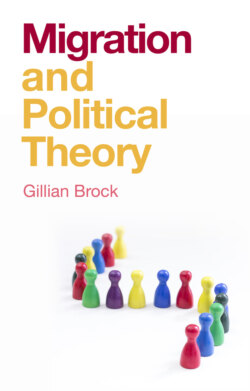Читать книгу Migration and Political Theory - Gillian Brock - Страница 17
2.1.1 Walzer, self-determination and protecting the character of communities
ОглавлениеWalzer starts from the important idea that states are (or should be) self-determining communities and that this has considerable value. Their ability to control borders is an important right if they are to continue to be self-determining. If they are unable to restrict immigration, this might have important implications for those who are already members of the state. Perhaps it will undermine the community’s ability to provide education, healthcare, or other necessary goods to current citizens. If too many enter, this might even affect the community’s character and identity, leading to considerable cultural change, perhaps even threatening the preservation of that community’s character entirely, should enough culturally diverse newcomers settle on the territory.
However, even though Walzer defends relatively strong rights to restrict entry, he also acknowledges that states have obligations of mutual aid (or good Samaritanism) that require states to admit the desperately needy in certain cases, such as when strangers are seeking refuge. On the good Samaritanism account, positive assistance is morally required if there is urgent need and the costs or risks to the would-be helper are low. Walzer applies this reasoning to groups but with important qualifications. Political communities must take in needy strangers under certain conditions, and this invites further analysis of our responsibilities in such cases.
When strangers are in need, just what are our obligations? For some strangers in need, we can supply resources where they are. In the case of refugees, however, what they need is access to our territory, for instance when they are victims of political or religious persecution. In some cases, there is a causal connection between our actions and their status as refugees now. An example of this would be the United States’ involvement in the Vietnam War which created a large refugee population. Following Walzer’s line of argument, the United States had a stronger obligation to admit those refugees than other nations who were not involved. The United States in fact did resettle a large number of refugees from Laos, Cambodia, and Vietnam in the wake of that war, settling close to one million refugees at that time.
What about when the number of refugees is very large? Walzer admits that there are limits to our collective liability to take in needy strangers, but it is difficult to know how to specify such limits. Ultimately, the right to restrict entrants remains an important aspect in our ability to have communal self-determination and to preserve our cultural identity. We continue to discuss issues concerning refugees in the next chapter, but for the purposes of this chapter it is important to appreciate that Walzer recognizes significant limits on the right to self-determination, even while he defends such rights.
Another important constraint on the right to self-determination concerns the situation of migrant workers. Walzer argues that a state may not admit guest or migrant workers to labor in the country without offering them a pathway to citizenship. Not to allow access to citizenship for such workers would be highly exploitative and would violate the ideal of self-determination. The processes of self-determination through which a state shapes its internal life must be equally open to all who live in the territory, work in the local economy, and are subject to its local laws. We consider the rights of migrant workers in more detail in chapter 7. For now, once again, we should appreciate that Walzer’s defense of the right to self-determination also includes some important normative constraints.
